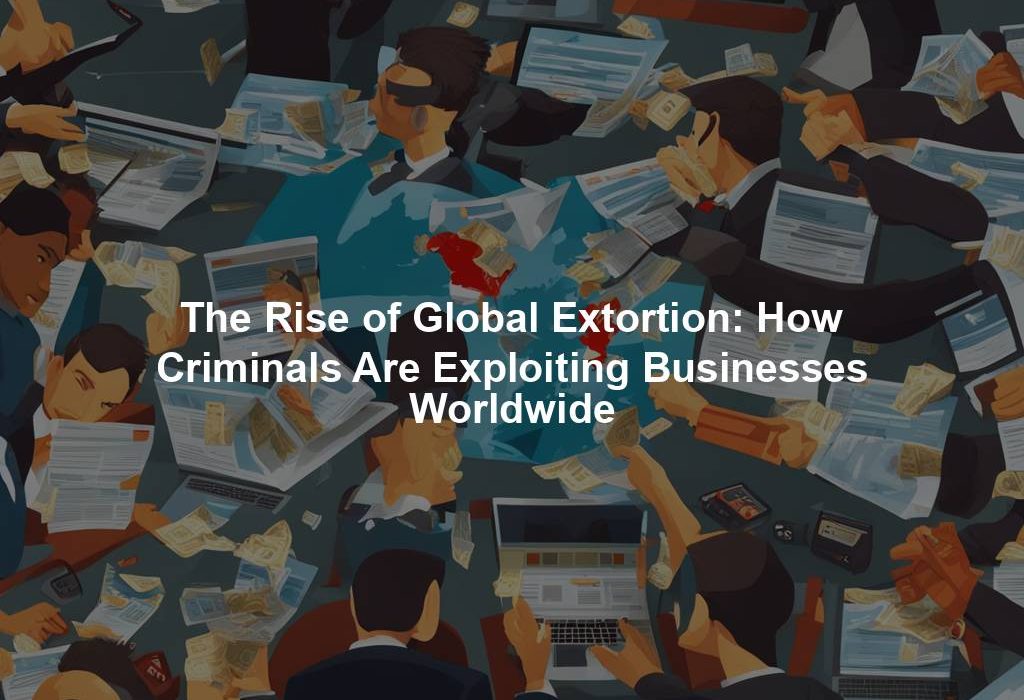In recent times, a shadow has fallen over businesses globally in the form of extortion. Criminal elements are preying on businesses across sectors, utilizing tactics like ransomware attacks, data breaches, and even physical intimidation to extract money and information from these enterprises. The surge in global extortion vividly showcases the vulnerabilities that countless businesses confront in today’s hyper-connected world.
The Grim Reality of Ransomware Assaults
Ransomware assaults have emerged as a pervasive form of extortion targeting businesses worldwide. In these insidious attacks, criminals encrypt a company’s data and demand a ransom for a decryption key. The consequences of non-payment are dire, with threats looming of data deletion or public exposure.
Reports from cybersecurity authority Symantec reveal a 37% increase in ransomware incidents in 2020 compared to the previous year. Shockingly, the average ransom demanded by cybercriminals more than doubled, ballooning to $312,493 in 2020.
One highly publicized ransomware attack struck the Colonial Pipeline, a critical fuel pipeline operator in the United States. In May 2021, the company capitulated to a $4.4 million ransom to regain control of its systems following a hacker’s encryption. The fallout from this attack reverberated across the East Coast, causing widespread fuel supply disruptions and laying bare the vulnerabilities of vital infrastructure to cyber threats.
Data Breaches and the Scourge of Information Theft
Beyond ransomware incursions, culprits exploit businesses through data breaches and information theft. These breaches involve unauthorized access to a company’s systems, leading to the pilfering of sensitive data such as customer records, proprietary information, and financial data. The stolen data is then leveraged for extortion or peddled to the highest bidder on the dark web.
A study by cybersecurity firm Verizon underscores the rampant nature of data breaches in the business realm, with over 1,700 instances reported in 2020 alone. Financial motivations propel the majority of these breaches, with criminals seeking to profit from stolen data through extortion or alternative avenues.
A glaring example of information theft and extortion is the infamous Ashley Madison data breach of 2015. This breach laid bare the personal data of countless users of the adulterous networking site, including their personal details and payment information. Hackers demanded a staggering $60 million ransom from the company to prevent data disclosure, ultimately leading to the website’s downfall.
The Specter of Physical Intimidation and Extortion
In a troubling trend, criminals aren’t confining extortion to the digital realm; they’re resorting to physical intimidation and threats against businesses. Extortion rackets are rife, with criminals demanding protection money to spare companies and their employees from harm. Some unscrupulous groups even escalate to violence or arson to strong-arm businesses into compliance.
A United Nations Office on Drugs and Crime (UNODC) report highlights extortion as a pervasive threat affecting businesses of all sizes and sectors. Companies in regions with weak legal frameworks are especially susceptible, lacking the safeguards and means to resist criminal coercion effectively.
Mexico stands out as a recent hotspot for physical extortion, with criminal syndicates targeting the tourism sector. Hotels, eateries, and tour operators find themselves at the receiving end of extortion demands, with criminals resorting to threats of violence or property damage for non-compliance. While the Mexican government has undertaken measures to curb these extortion rings, many businesses continue to operate under the pall of fear and potential reprisals.
Impacts on Businesses and the Global Economic Landscape
The surge in global extortion heralds dire implications for businesses and the broader economy. Extortion can trigger financial losses, tarnish reputations, and disrupt operations, exacting hefty costs on affected companies. In severe cases, businesses may face closure or bankruptcy in the wake of extortion threats.
An International Chamber of Commerce (ICC) study estimates that extortion siphons off billions of dollars from the global economy annually. Small and medium-sized enterprises (SMEs) are especially susceptible, lacking the means and expertise to shield themselves from criminal threats effectively.
The ramifications of extortion extend beyond financial losses, encompassing enduring consequences like fractured customer trust, legal entanglements, and regulatory sanctions. Companies falling prey to extortion may grapple with restoring their damaged reputation and rebuilding trust with clients and stakeholders.
Mitigating and Countering Extortion Menaces
Given the escalating specter of global extortion, businesses must adopt proactive measures to defend against criminal predation. Robust cybersecurity investments encompassing firewalls, encryption, and employee training are imperative to fortify data and system defenses.
Should an extortion threat materialize, businesses need a comprehensive response strategy to contain the impact. This plan should outline protocols for threat identification, engagement with law enforcement agencies, notifications to affected parties, and seeking legal counsel for navigating the crisis. Businesses should contemplate acquiring cyber insurance to shield themselves from financial fallout due to extortion attacks.
Crucially, collaborative efforts among governments, law enforcement bodies, and private sector entities are pivotal in combatting global extortion. International cooperation facilitates the tracking and prosecution of criminal entities orchestrating extortion schemes, alongside knowledge sharing to avert future assaults. Through cohesive action, businesses and governments can forge a safer, more secure operational landscape for enterprises worldwide.
In Conclusion
The rise of global extortion casts a long, dark shadow over businesses globally, as criminals leverage various tactics to exploit companies for monetary gain. Ransomware assaults, data breaches, and physical threats represent merely a glimpse into the arsenal of tools employed by criminals to extort businesses, inflicting significant costs and disruptions on affected enterprises.
To shield themselves from the scourge of extortion, businesses must allocate resources to cybersecurity defenses, devise response frameworks, and collaborate with governmental and law enforcement bodies to combat criminal malfeasance. By proactively safeguarding their data and systems, companies can curtail the risk of falling victim to extortion, ensuring the resilience and enduring prosperity of their operations in an increasingly interconnected world.




